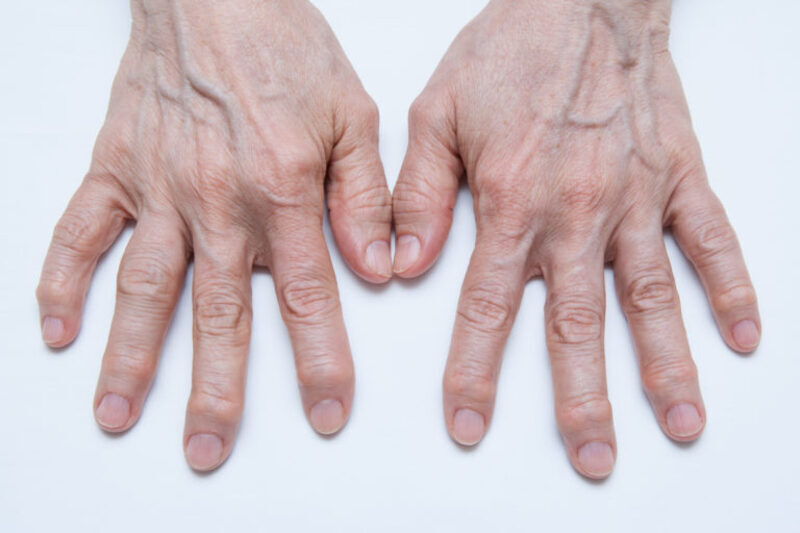-
- Market Research
- |
- CBD Near Me
- |
- Giveaways
- |
- Newsletter
- |
- Contact
- |
- Advertise
- |

Cannabidiol (CBD) is growing in its promise as an alternative therapy for arthritis. A 2017 study by Dalhousie University in Canada is the latest of several studies to suggest CBD may be a safe and effective treatment by preventing pain and nerve damage caused by arthritis. Other studies also show swelling, inflammation, and pain relief can come from simply rubbing CBD topicals on affected joints. These potential benefits may provide arthritis patients with a new hope for a more comfortable life.
An Overview of Arthritis
Arthritis is the leading cause of disability in America, according to the Arthritis Foundation. At least 54 million adults have arthritis, and 300,000 children have a form of arthritis as well. The prevalence is growing too, as more than 78 million people are expected to have arthritis by the year 2040.
Nearly two-thirds of those with arthritis are working age, making it one of the most costly conditions. In 2013, arthritis cost the US population $140 billion in medical costs and $164 billion in lost earnings, for a total of $304 billion in economic loss.

Arthritis is a general term for joint disease or joint pain. Symptoms can include swelling, pain which may become chronic, stiffness, decreased range of motion, and potential permanent joint changes.
Women are more likely to develop arthritis than men. Obesity, aging, family genetics, and previous injuries can also increase susceptibility to arthritis.
How Arthritis Works
Before understanding how CBD can help arthritis patients, it is important to know how arthritis works.
More than 100 forms of arthritis exist, so the pathophysiology (the process and progression of a disease) depends on the type of arthritis.
Degenerative Arthritis (Osteoarthritis)
Osteoarthritis (OA) is the most common form of arthritis, affecting about 31 million Americans.
OA is a degenerative disease where the cartilage between bones deteriorates. This leaves bone to grind against bone, causing severe pain that leads to swelling and stiffness.
Previously, OA was thought to be caused by a breakdown of the joints over time, but now scientists believe it is a disease of the cartilage. Possible contributing factors that may speed up the natural deterioration of cartilage include injury, obesity, and genetics.

Inflammatory Arthritis (Rheumatoid Arthritis)
Rheumatoid arthritis (RA) is an autoimmune disease where the immune system mistakenly attacks the joints.
This attack leads to joint pain, swelling, and inflammation. RA can also damage internal organs, eyes, and other parts of the body aside from the joints.
The cause is unknown, but genetics and environmental factors may be to blame. For example, people with certain genetic markers such as the HLA shared epitope and those who are exposed to cigarette smoke may be at a greater risk to develop RA.
Other Forms of Arthritis
Infectious arthritis is caused by bacteria or viruses and can infect the joints causing inflammation and pain. Infectious arthritis is often taken care of with antibiotics, but if it isn’t treated quickly and adequately, infectious arthritis can turn chronic.
Metabolic arthritis is caused by the buildup of uric acid in the joints. This causes sharp pain and may lead to a gout attack. Metabolic arthritis can also become chronic.
Medication
Arthritis does not have a cure, but it can go into remission through the use of medication.
Typical arthritis medications include non-steroidal drugs, corticosteroids, and disease-modifying antirheumatic drugs.
While they may be effective, medications also have several possible side effects such as stomach ulcers, increased risk of infection, blood clots, heart attack, stroke, and increased blood sugar levels which can lead to diabetes.
The long-term use of drugs can be harmful and may add complications on top of arthritic symptoms.
On the other hand, CBD has been shown to be a potentially effective and safe alternative, offering only a few, mild side effects.
Studies on CBD for Arthritis
Admittedly, scientific research on CBD for human arthritis is scarce, but researchers are finding consistent results across various studies which prompt them to conclude that CBD has promising potential and deserves continued investigation. Some of the benefits studies have revealed about CBD include decreasing and preventing pain, reducing inflammation, and preventing nerve damage:
| RESEARCH | HOW CBD HELPS |
| Sativex and Arthritic Pain | Sativex significally reduced pain during movement and at rest, and also improved sleep quality. |
| The Endocannabinoid System in Osteoarthritis | Scientist believe the endocannabinoid system contributes to arthritis and is a compelling target to treat osteoarthritis. |
| Topical CBD and Arthritis | Topically-applied CBD significally reduced joint swelling, inflammation, and pain-related behaviors in mice. |
| CBD and Neuropathic Pain | CBD blocked osteoarthritic pain by reducing joint inflammation. |
| Oral CBD for Arthritis | CBD had “potent” anti-inflammatory effects on arthritis. |
Cannabis-Based Oral Spray Reduces Arthritis Pain
In a study conducted in 2006 by the Royal National Hospital for Rheumatic Diseases in the UK, 58 rheumatoid arthritis patients were treated with Sativex (a cannabis-based medicine administered orally containing CBD and THC) for five weeks to test its effectiveness on pain.
Patients were randomly split into two groups, 31 taking Sativex and 27 taking a placebo. Those taking Sativex had significantly reduced pain during movement and at rest, and also reported improved sleep quality.
All side effects were mild or moderate and did not result in withdrawals from the study. Researchers concluded that Sativex was clinically relevant and should be tested further.
The Role of the Endocannabinoid System and Cannabinoids in Osteoarthritis
The Laboratori de Neurofarmacologia (Laboratory of Neuropharmacology) at Universitat Pompeu Fabra in Spain put together a review in 2014 discussing the role of the endocannabinoid system and cannabinoids such as CBD in osteoarthritis.
Surveying preclinical data, scientists concluded that the endocannabinoid system is a compelling target to treat osteoarthritis and CBD had shown promise as an effective treatment in rodents.
Topical CBD Reduces Swelling, Inflammation, and Pain
Scientists at the University of Kentucky College of Pharmacy and College of Medicine produced a study testing the effectiveness of topically-applied CBD gel for rats with arthritis. The rats were treated with different doses (0.6, 3.1, 6.2 and 62.3 mg/day) of CBD for four days.
Significant reductions in joint swelling, inflammation, and pain-related behaviors were observed. The most effective dosages were 6.2 and 62 mg/day. Researchers found no signs of side effects.
CBD Eases Nerve Pain and May Prevent Development of Joint Pain
The 2017 Dalhousie University study mentioned earlier used rats with osteoarthritis to determine if CBD could ease nerve pain therapeutically and potentially prevent the development of joint pain.
The results showed applying CBD locally blocked osteoarthritis pain by reducing joint inflammation. CBD demonstrated promise as a preventative by inhibiting the development of pain and protecting nerves in the joints.
The researchers suggested that CBD may be a safe and useful therapy for osteoarthritis joint pain.
Oral CBD Has “Potent” Anti-Inflammatory Effect
The Kennedy Institute of Rheumatology in the UK studied the effect of oral CBD on arthritic mice.
CBD was found to protect joints from severe damage by suppressing the immune system’s inflammatory response, such as the release of tumor necrosis factor. The optimal dosage was 25 mg/kg per day.
Researchers concluded CBD’s ability to suppress immune response and its anti-inflammatory effects on arthritis were “potent.”
How CBD Treats Arthritis
CBD provides its therapeutic benefits by interacting with the endocannabinoid system, the body’s own system of naturally occurring cannabinoids and associated receptors. As a cannabinoid, CBD can bind to receptors within the endocannabinoid system to potentially help treat diseases, including arthritis.
Some of the promising benefits CBD may offer arthritis patients include reducing inflammation, relieving pain, and protecting neurons which may lead to the prevention of arthritic symptoms.

CBD as an Anti-Inflammatory
When the immune system mistakenly attacks the joints, it causes inflammation via the release of cytokines. One of the most prevalent cytokines is tumor necrosis factor (TNF). In arthritis, TNF is prevalent within the joints and a major cause of inflammation.
CBD reduces inflammation by suppressing the immune system’s response. The University of Kentucky study suggests that by activating the TRPV1 receptors, CBD can reduce inflammation in the joints caused by TNF.
The same study also demonstrated that CBD reduced pro-inflammatory biomarkers.
Decreasing inflammation can stop joint swelling, protect nerves from damage, improve range of motion, reduce stiffness, and provide pain relief. CBD’s anti-inflammatory effect could be particularly helpful for those with rheumatoid arthritis.
CBD as an Analgesic
In addition to decreasing inflammation by interacting with TRPV1 receptors, CBD desensitizes the receptors, resulting in pain relief.
CBD also promotes the levels of an endocannabinoid that is a natural pain reliever called anandamide which interacts with TRPV1. Through the inhibition of anandamide’s primary enzyme, CBD helps anandamide last longer in the body and provide analgesic benefits.
CBD also helps relieve pain by preventing glutamate neurotoxicity. Glutamate is a neurotransmitter and may be produced in excess in osteoarthritis according to research by National Sun Yat-sen University in Taiwan.
When glutamate is produced in excess, it can cause damage to neurons, resulting in pain for arthritis patients. However, CBD can inhibit glutamate release and may provide pain relief, especially for those with osteoarthritis.
CBD’s Neuroprotective Effects
As the Dalhousie University study noted, CBD demonstrated neuroprotective effects in the mice when it was administered before they were induced with osteoarthritis. This is important because neuron damage in the joints causes pain and is a factor in disease progression.
Thus, protecting neurons may prevent pain and slow down disease or stop it altogether.
Glutamate toxicity and oxidative stress are thought to be two major causes of neuronal damage and contributors to the development of arthritis.
As already noted, excess glutamate leads to the damage and eventual death of nerve cells, but CBD inhibits glutamate production.
Oxidative stress is caused by an increase in reactive oxygen species (ROS), a chemical byproduct of the natural breakdown of oxygen in the human body. The increase causes damage and death to neurons, resulting in arthritic pain. Rheumatoid arthritis, in particular, has been shown to induce oxidative stress.
However, CBD has been able to reduce ROS-induced damage to neurons in studies.
The possibility of CBD as a preventative and neuroprotective agent could help many people who are at high risk of arthritis possibly prevent its development or help those who have early stage arthritis slow down its progression.
How Patients May Use CBD

As the studies above suggest, using CBD topically and orally may be most effective.
Administering CBD gel or salve topically allows patients to specifically target the joints experiencing symptoms. Additionally, this type of usage has shown no evident side effects.
CBD can also be taken orally, often in the form of capsules or a spray (like Sativex). However, according to the University of Kentucky study, CBD has lower bioavailability when taken orally, so dosages may need to be higher when ingested by mouth in order to produce adequate effects. Additionally, only mild side effects were reported in the Sativex study.
Always talk with a doctor or physician before taking CBD.
CBD Offers a Promising Alternative to Arthritis Patients
As the leading disability in America, asthma can severely complicate the lives of its patients, and the consequences are not merely physical. Social and vocational lives suffer as well, decreasing quality of life.
According to the review by the Universitat Pompeu Fabra, there are no current medications which can control the progression of osteoarthritis and treatments for pain are limited in effectiveness. Add to this the prevalence of arthritis, and the need to find a viable treatment is paramount.
Fortunately, CBD may be that treatment. While more research is needed, current studies are promising and growing. With few to no evident side effects, CBD is a safer potential therapy than current arthritis medications, according to the University of Kentucky study.
For the millions affected by arthritis, the potential of CBD is providing hope for a functional and active life.
Have you used CBD to treat your arthritis? What type of results have you achieved? Let us know in the comments below!
Disclaimer: The content on this site is for informational purposes only. We are not medical experts and nothing should be construed as medical advice. Be sure to speak with your physician before taking CBD or any other treatment.








2 Comments
I really appreciate this post. I’ve been looking all over for this! Thank goodness I found it on this blog . You have made my day! I think this is engaging and eye-opening material. Thank you so much for caring about your content and your readers.
We really appreciate your feedback!